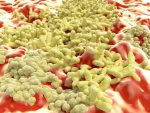Digestive problems affect more than 80% of Rett patients: Study
Clinicians underestimate medical burden of GI symptoms, researchers say
Written by |

Digestive problems, such as constipation and bloating, affect more than 80% of girls and women with Rett syndrome, a study reveals.
The most frequent problems included constipation, difficulties with eating and swallowing, and gas and bloating. More than half of the patients showed irritability due to stomach or gut discomfort. Use of medications was associated with significantly better digestive health.
Gastrointestinal (GI) problems “pose a significant medical burden to caregivers,” scientists wrote. “Medical providers underestimate the burden of GI issues in RTT [Rett]…. Improved recognition of these issues may allow for improved treatment and enhanced quality of life for girls and women affected by RTT.”
The study, “Gastrointestinal manifestations of Rett syndrome: An updated analysis using the Gastrointestinal Health Questionnaire,” was published in the Journal of Pediatric Gastroenterology and Nutrition.
Rett syndrome is a rare neurological disorder that primarily affects girls, with symptoms appearing at an early age. After a period of normal early development, girls with Rett experience problems with cognitive, sensory, emotional, and motor skills between ages 6 and 18 months.
Digestive problems predispose patients to nutritional deficiencies
Digestive problems, including gastroesophageal reflux disease, chronic constipation, and bloating, are a significant concern for Rett patients and their families. These issues may predispose patients to nutritional deficiencies that impact growth and overall development. Notably, the most common side effects of the first Rett treatment approved in the U.S., Daybue (trofinetide), are diarrhea and vomiting.
So, “to properly assess the impact of trofinetide [Daybue] use, along with other future medications for RTT, it is critical that we have a more complete understanding of the baseline prevalence of GI [gastrointestinal] symptoms in individuals with RTT,” the scientists wrote.
In the study, 118 parents or caregivers, predominantly mothers (86%), provided insights about girls and women with Rett. The researchers also included 27 parents of healthy girls (who were siblings, relatives, or unrelated) as a control group. All participants were from the U.S.
The researchers used the Gastrointestinal Health Questionnaire to collect the information, a validated tool for Rett patients. The questionnaire evaluates the impact of four different categories: gastrointestinal problems, personality and mood, medications and surgery, and parenting. However, the last category was omitted from the study to focus only on the patients’ results.
The Rett patients were from 2 to 53 years old, with a median age of 13. The specific genetic mutations were moderate in half of the patients, and severe in about a quarter of the participants, and mild in the rest.
Overall, results showed more than 80% of Rett patients were sometimes affected by a GI symptom at least part of the time.
Most common symptom was constipation
The most common symptom was constipation (81%), with many participants reporting big stools. Flatulence (70%) was the most reported issue related to gas and bloating. Excessive drooling was also common, in 73%, the same percentage that reported issues with eating, chewing, and swallowing. In comparison, diarrhea was less common, being reported by 35%-39% of parents.
About half of the parents or caregivers reported their daughters had general health issues or pain related to stomach or intestinal problems, including feeling unwell, irritability, breath-holding, and difficulties with swallowing air and gaining weight.
Most patients needed regular medications to manage their symptoms. Nearly two-thirds (64%) used laxatives for constipation, whereas half (52%) used medications to control stomach acid.
When compared to unaffected individuals of the same age, Rett patients experienced significantly more digestive problems across all categories studied. However, there was no difference in the gastrointestinal health score based on mutation severity.
In conclusion, the frequency of GI issues found in this study was higher than in a prior analysis of an insurance claims database.
“Strikingly,” the investigators wrote, “when completing a survey to assess the prevalence of [gastrointestinal] symptoms in RTT patients, only 40% of neurologists and 50% of pediatricians caring for RTT individuals, on average, reported constipation in their patients. Given that our data came directly from parental or caregiver reporting, our findings are likely a more accurate depiction of the true burden of [gastrointestinal] issues on RTT individuals.”
The scientists noted that as all participants were from the U.S., the results may not be the same in other populations, as differences in food, culture, socioeconomic status, and medical access may have an impact on the findings.







